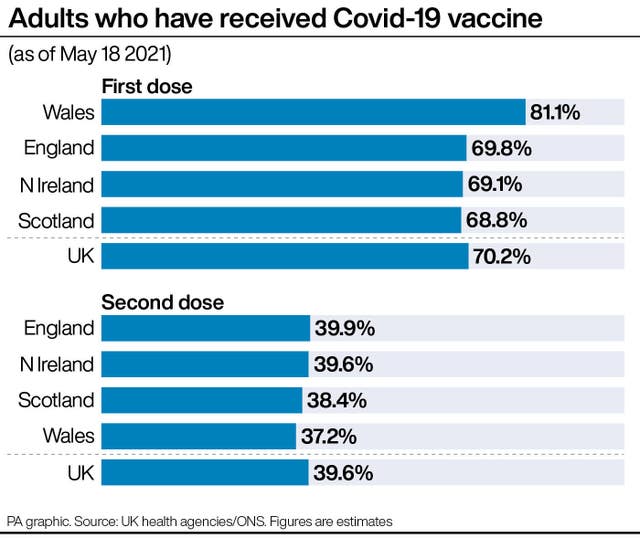UK in ‘straight race’ between vaccinating public and spread of Indian variant
Professor Jonathan Van-Tam said the NHS would ‘turbo-boost’ the jab rate, with 34-year-olds being invited to book a vaccine.

Britain is in a “straight race” to vaccinate its population in order to outrun the threat of the Indian coronavirus mutation, according to England’s deputy chief medical officer.
Professor Jonathan Van-Tam said the jab-rate over the next few weeks would be crucial for ensuring the Prime Minister could lift all Covid restrictions on June 21, as set out in his road map out of lockdown.
As part of efforts to “turbo-boost” the vaccine programme, more than one million people aged 34 and 35 will receive a text message on Thursday or Friday asking them to come forward for their Covid vaccine, NHS England confirmed.
It comes amid growing confidence within the Government that the vaccines available in the UK will work against the Indian strain and that the B1617.2 mutation will prove less transmissible than first feared.
Almost 3,000 cases of the Indian variant have been identified in the UK – up from the 2,323 declared on Monday – and surge testing has been announced in a number of areas in a bid to control its spread.
Prof Van-Tam told a Downing Street press conference on Wednesday: “I pitch this personally as a straight race between the transmissibility of this new variant … and vaccine delivery.
“The NHS is doing everything it can to turbo-boost that, and that is the challenge that’s ahead of us in the next two to three to four weeks, to make sure that we outrun the virus through really vigorous pull-through on vaccine delivery.”
Prof Van-Tam said scientists would have more information by next week on how transmissible the Indian variant is versus the Kent strain, which has become dominant in the UK.
Experts had feared it could be up to 50% more transmissible, but the Government adviser suggested studies could find it is only half that.
The spread of the variant of concern had cast doubt on next month’s plans to ease the remaining restrictions in England, but Boris Johnson told the Commons his administration had “increasing confidence” that vaccines would prove effective against it.
Sources confirmed Mr Johnson told the 1922 Committee of backbench Conservative MPs he was “even more cautiously optimistic” than last week about being able to scrap all restrictions next month.
Health Secretary Matt Hancock struck a more cautious tone at a press briefing earlier in the day, saying a final decision on whether to move to the next stage of the road map would be taken as late as possible – on June 14, a week before the measures would take effect.
“Until then, it is just too early to say,” said the Cabinet minister.
Mr Hancock defended the Government’s moves to open up international travel via a traffic light system after the ban on international holidays was lifted on Monday, as part of the latest phase of lockdown easing.
There had been confusion after his Cabinet colleagues offered different answers this week about the circumstances under which people could visit countries on the “amber list”, to which travel is allowed but not encouraged.
The Health Secretary said the messaging had been “crystal clear” that the public “should not go to an amber or red list country on holiday” and that any visits could only be in “exceptional circumstances”.

Passengers arriving from amber list countries are required to self-isolate for 10 days and take two tests, with Mr Hancock saying 30,000 home visits had been carried out in the last week to check people were quarantining.
However, Ryanair boss Michael O’Leary said “most of the UK population doesn’t understand” the rules on travelling to amber-listed destinations, with people “booking in their droves” to take holidays in places not on the green list this summer.
International travel rules for England, Wales and Scotland are broadly similar.
In Northern Ireland, journeys to the Common Travel Area – which consists of the UK, Republic of Ireland, Channel Islands and Isle of Man – for visits to family and friends will be allowed from May 24.
But the Stormont Executive has not made a decision about the resumption of international leisure travel from Northern Ireland.





